必修一---直接引语变间接引语
- 格式:docx
- 大小:15.62 KB
- 文档页数:3
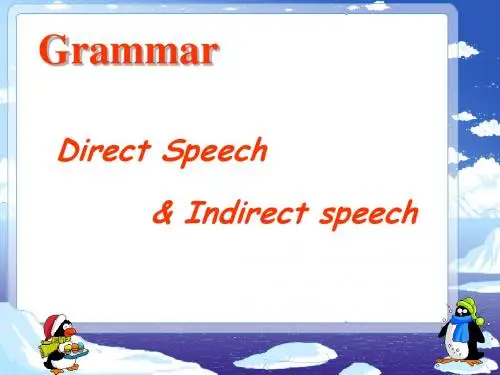
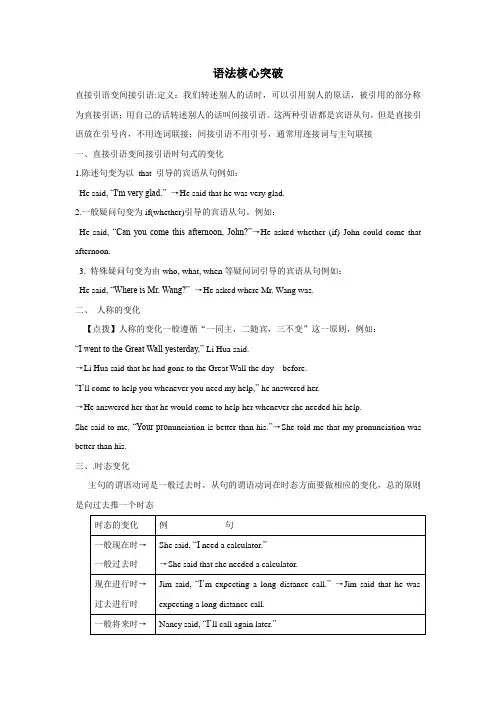
语法核心突破直接引语变间接引语:定义:我们转述别人的话时,可以引用别人的原话,被引用的部分称为直接引语;用自己的话转述别人的话叫间接引语。
这两种引语都是宾语从句,但是直接引语放在引号内,不用连词联接;间接引语不用引号,通常用连接词与主句联接一、直接引语变间接引语时句式的变化1.陈述句变为以that 引导的宾语从句例如:He said, “I'm very glad.” →He said that he was very glad.2.一般疑问句变为if(whether)引导的宾语从句。
例如:He said, “Can you come this afternoon,John?”→He asked whether (if) John could come that afternoon.3. 特殊疑问句变为由who, what, when等疑问词引导的宾语从句例如:He said, “Where is Mr.Wang?” →He asked where Mr. Wang was.二、人称的变化【点拨】人称的变化一般遵循“一同主,二随宾,三不变”这一原则,例如:“I went to the Great Wall yesterday,” Li Hua said.→Li Hua said that he had gone to the Great Wall the day before.“I’ll come to help you whenever you need my help,” he answered her.→He answered her that he would come to help her whenever she needed his help.She said to me, “Your pro nunciation is better than his.”→She told me that my pronunciation was better than his.三、.时态变化主句的谓语动词是一般过去时,从句的谓语动词在时态方面要做相应的变化,总的原则是向过去推一个时态时态的变化例句一般现在时→一般过去时She said, “I need a calculator.”→She said that she needed a calculator.现在进行时→过去进行时Jim said, “I’m expecting a long distance call.”→Jim said that he was expecting a long distance call.一般将来时→Nancy said, “I’ll call again later.”过去将来时→Nancy said that she would call again later. 一般过去时→过去完成时He said, “I took it home with me.” →He said that he had taken it home with him. 现在完成时→过去完成时Paul said, “Our team has won the match.” →Paul said that their team had won the match. 过去完成时→过去完成时He said, “I had finished my homework before supper.” →He said that he had finished his homework before supper.四、 指示代词、时间状语、地点状语和动词的变化变化形式 例句 指示代词 this → that She said, “She is coming this week.” →She said that she was coming that week. these → thoseHe said, “These books are mine.” →He said those books were his.时间状语 语now →thenHe said, “It ’s ten o ’clock now.” →He said that it was ten o ’clock then. today → that dayHe said, “I haven ’t seen her today.”→He said that he hadn ’t seen her that day. tonight →that night She said, “I’ll come again tonight.” →She said that she would go again that night. yesterday →the day beforeHe said, “This happened yesterday.” →He said that had happened the day before. three days ago → three days before She said, “I arrived two days ago.” →She said that she had arrived two days before. tomorrow → the next day the following day She said, “He ’ll be back tomorrow.” →She said that he would be back the next day.next week →the next week She said, “I’ll do it next week.” →She said that she would do it the next week.地点状语here→thereShe said, “He came here to see Tom.”→She said that he had gone there to see Tom.动词come/bring→go/takeHe said, “I brought it home with me.”→He said he had taken it home with him.【拓展延伸】直接引语变为间接引语时时态不作改变的情况①主句的谓语动词为现在或将来时态,从句的时态无需变化例如:He says, “I’m tired.”→He says that he is tired.He will say, “The boy was lazy.”→He will tell you that the boy was lazy.②当直接引语是客观真理时,不受时间的限制,因此不需要变化时态。
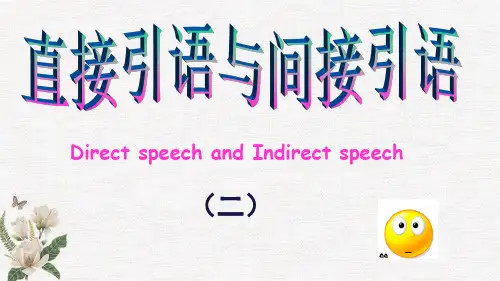
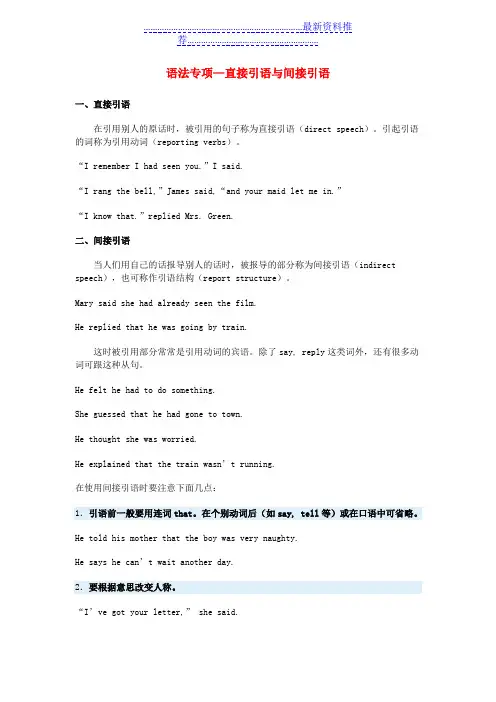
语法专项—直接引语与间接引语一、直接引语在引用别人的原话时,被引用的句子称为直接引语(direct speech)。
引起引语的词称为引用动词(reporting verbs)。
“I remember I had seen you.”I said.“I rang the bell,”James said,“and your maid let me in.”“I know that.”replied Mrs. Green.二、间接引语当人们用自己的话报导别人的话时,被报导的部分称为间接引语(indirect speech),也可称作引语结构(report structure)。
Mary said she had already seen the film.He replied that he was going by train.这时被引用部分常常是引用动词的宾语。
除了say, reply这类词外,还有很多动词可跟这种从句。
He felt he had to do something.She guessed that he had gone to town.He thought she was worried.He explained that the train wasn’t running.在使用间接引语时要注意下面几点:1.引语前一般要用连词that。
在个别动词后(如say, tell等)或在口语中可省略。
He told his mother that the boy was very naughty.He says he can’t wait another day.2.要根据意思改变人称。
“I’ve got your letter,” she said.→She said to him, “Your pronunciation is better than mine.”→3.引语中的谓语要和句子主要谓语在时态上一致。
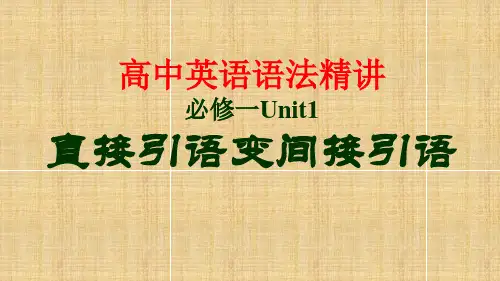
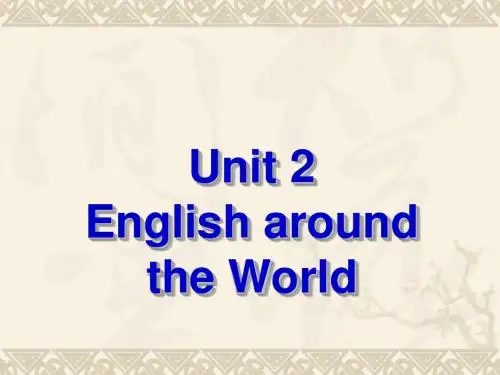
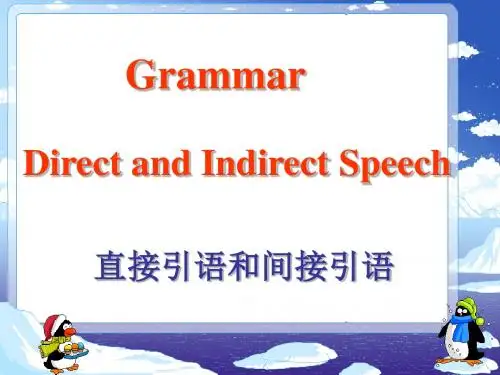


高一英语最佳同步资料▏直接引语变间接引语,360度无死角!一. 语法讲解直接引述别人的原话,叫直接引语,直接引语通常都用引号括起来。
用自己的话把别人的话陈述出来,叫间接引语。
间接引语在多数情况下都构成一个宾语从句。
Direct SpeechShe said, “I like singing. ” She said, “I am waiting for a bus.”Indirect Speech She said she liked singing.She said she was waiting for a bus.总结:直接引语是陈述句,变为间接引语时用连词that 引导宾语从句。
从句中的人称、时态、指示代词、时间状语和地点状语等相应变化。
Direct Speech She asked, “Have you seen the film?” He asks, “Are you a doctor, John?” Indirect SpeechShe asked me whether/if I had seen the film.He asks John if/whether he is a doctor.She asked us, “Where are you going to get off?” He asked them, “Who gave you a talk yesterday?”She asked us where we were going to get off.He asked them who had given them atalk the day before.总结:直接引语是一般疑问句,变为间接引语时,用连词if 或whether 连接。
直接引语是特殊疑问句,变为间接引语时,仍用原来的疑问词作连词来引导。
Direct Speech The teacher said to the students,“Use your time wisely.” She said to me,“Open the door.” The teacher said to the students,“Don’t waste your time.”Indirect SpeechThe teacher told the students to use their time wisely.She asked me to open the door. The teacher told the students not to waste their time.总结:直接引语是祈使句时,采用“动词+宾语+不定式”结构,即ask/tell/order sb. (not) to do sth.注意:直接引语如果是客观真理,变间接引语时,时态不变。
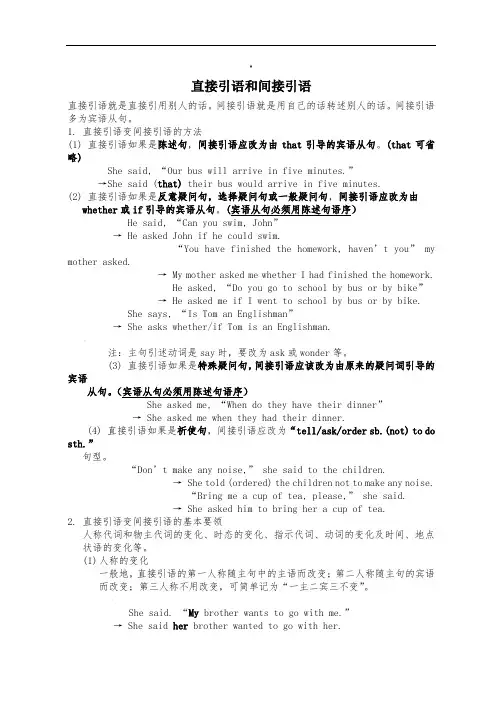
#直接引语和间接引语直接引语就是直接引用别人的话。
间接引语就是用自己的话转述别人的话。
间接引语多为宾语从句。
1. 直接引语变间接引语的方法(1) 直接引语如果是陈述句,间接引语应改为由that引导的宾语从句。
(that可省略)She said, “Our bus will arrive in five minutes.”→She said (that) their bus would arrive in five minutes.(2) 直接引语如果是反意疑问句,选择疑问句或一般疑问句,间接引语应改为由whether或if引导的宾语从句。
(宾语从句必须用陈述句语序)He said, “Can you swim, John”→ He asked John if he could swim.“You have finished the homework, haven’t you” my mother asked.→ My mother asked me whether I had finished the homework.He asked, “Do you go to school by bus or by bike”→ He asked me if I went to school by bus or by bike.She says, “Is Tom an Englishman”→ She asks whether/if Tom is an Englishman.、注:主句引述动词是say时,要改为ask或wonder等。
(3) 直接引语如果是特殊疑问句,间接引语应该改为由原来的疑问词引导的宾语从句。
(宾语从句必须用陈述句语序)She asked me, “When do they have their dinner”→ She asked me when they had their dinner.(4) 直接引语如果是祈使句,间接引语应改为“tell/ask/order sb.(not) to do sth.”句型。
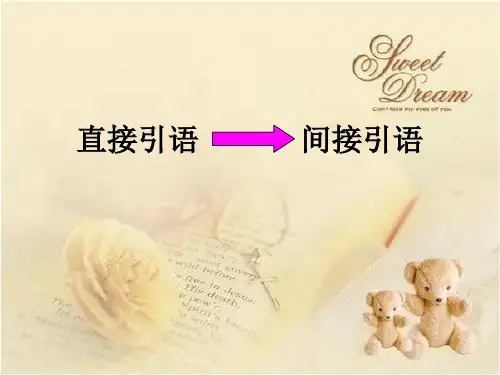
直接引语变成间接引语句子构造变化1〕陈述句He said, “I have been to the Great Wall. 〞———He said to us that he had been to the Great Wall.用连词that 引导,that 在口语中常省略。
主句谓语动词可直用接引语中said, 也可用told 来代替,注意,可以说said that, said to sb. that, told sb. that,不可直接说told that2〕一般疑问句He said, “Do you have any difficulty with pronunciation〞He asked (me) whether/if I had any difficulty with my pronunciation.间接引语用连词whether 或if 引导,原主句中谓语动词said 要改为asked(me/him/us 等),语序是陈述句语序3〕特殊疑问句He said to me,“What's your name〞————He asked me what my name was.原来疑问词作为间接引语连词,主句谓语动词用ask(sb. )来表达,语序改为陈述句语序4〕选择疑问句He asked, “Do you speak English or French〞————He asked me whether I spoke English or French.用whether…or…表达,而不用if…or…,也不用either…or…5〕祈使句如果直接引语是祈使句,间接引语要用不定式复合构造改,即改为:tell (ask, order, warn, advise 等) sb. (not) to do sth. 如:The policeman said to the children, “Don’t play football in the street.〞The policeman told the children not to play football in the street.“Listen to me carefully, please.〞the teacher said to us.The teacher told us to listen to him carefully.【温馨提示】如果祈使句中出现了please, 在间接引语中必须省略。
【本讲教育信息】一、教学内容:必修1 Grammar: Direct speech and Indirect speech: statements and questions(一)陈述句直接引语变间接引语(二)疑问句直接引语变间接引语二、知识精讲:引述别人的话语一般采用两种方式:一是原封不动地引用原话,把它放在括号内,这叫直接引语(Direct speech);一是用自己的话加以转述, 这叫间接引语(Indirect speech).这两种引语都是宾语从句。
观察下面的句子,注意直接引语变为间接引语后,发生了哪些变化。
1) She said to me, “I can’t finish the work today.”She told me (that) she couldn’t finish the work that day.2) She said to me, “Have you read this book?”She asked me whether / if I had read that book.3) She said to her father, “How will you come here tomorrow?”She asked her father how he would go there the next day.4) She said, “He left twenty minutes ago.”She said (that) he had left twenty minutes before.5) She said, “What are you doing now?”She asked (me) what I was doing then.小结归纳通过以上例句我们可以发现,直接引语变为间接引语时,从句中的人称、时态、指示代词、时间状语、地点状语、动词等都需要进行相应的变化。
直接引语变间接引语(宾语从句)一.直接引语和间接引语的定义。
直接引语:直接引用别人的话叫直接引语,间接引语:用自己的话转述别人的话叫间接引语。
直接引语前后加引号;间接引语不必加引号。
He said, "I ' m a student. ” (直接引语)He said that he was a student. (间接引语)主句从句主句从句二.当直接引语为特殊疑问句变间接引语形成宾语从句时,首先要注意用特殊疑问词,其后用陈述语序的句子,同时注意人称、时态、时间状语,连接词,语序的变化. (一)人称的变化规则:一随主,二随宾,第三人称不更新。
★(二).时态变化宾语从句时态变化规则:主现从不限;主过从四过(即4种过去的时态:一般过去时;过去进行时;过去将来时;过去完成时) ;客观真理,只用一般现在时。
1.主句一般现在时,从句可用任意时态。
2.主句过去时,从句用相应的过去时态。
即一般现在时改成一般过去时;现在进行时改成过去进行时;一般将来时改成过去将来时;一般过去时、现在完成时、过去完成时改成过去完成时。
3.主句过去时,从句是客观真理时,只用一般现在时。
Teacher told us:" The moon moves round the earth."Teacher told us the moon moves round the earth.(三)•时间状语变化★(四)•连接词1•从句为陈述句,常选择连接词that或将that省略,直接与主句相连。
2.从句为一般疑问句,常选择连接词if或whether。
3.从句为特殊疑问句,常选择what,whe n,where,which,who,how 等的疑问代、副词作连接词。
注意:当who为主语时,句式为:who+胃语+其他1.语序不变的有:What' the matter with you What但What' s the trouble with you 的语序要变1)从句中有or / or not 。
语法----直接引语和间接引语
概念:直接引语:直接引述别人的原话。
一般前后要加引号。
间接引语:用自己的话转述别人的话。
间接引语在多数情况下可构成宾语从句且不要加引号。
例:Mr. Black said, “ I’m busy.”
Mr. Black said that he was busy.
变化规则
(一)陈述句的变化规则
直接引语如果是陈述句,变为间接引语时,用连词that(可省略)引导,从句中的人称、时态、指示代词、时间状语、地点状语都要发生相应的变化。
人称的变化——人称的变化主要是要理解句子的意思
例:1. He said, “ I like it very much.” →He said that he liked it very much.
2. He said to me, “I have left my book in your room.”
→He told me that he had left his book in my room.
时态的变化
例:
“I don’t want to set down a series of facts in a diary,” said Anne.→Anne said that she didn’t want to set down a series of facts in a diary.
The boy said, “I’m using a knife.”
→The boy said that he was using a knife.
▲注意:如果直接引语是客观真理,变为间接引语时,时态不变,如:
He said, “Light travels much faster than sound.”
He said that light travels much faster than sound.
(二) 祈使句的变化规则
如果直接引语是祈使句,变为间接引语时,要将祈使句的动词原形变为带to的不定式,并根据句子意思在不定式前加上tell/ask/order sb. to do sth.等动词,如果祈使句是否定句,在不定式前面还要加上not。
例:
The hostess said to us, “Please sit down.”
→The hostess asked us to sit down.
He said, “Don’t make so much noise, boys.”
→He told the boys not to make so much noise.
(三)疑问句的变化规则
如果直接引语是疑问句,变为间接引语时要把疑问句语序变为陈述句语序,句末用句号。
一般疑问句:如果直接引语是一般疑问句,变为间接引语时,谓语动词是say或said时,要改为ask 或asked,原问句变为由if/whether 引导的宾语从句。
例:
“Do you think a diary can become your friend?” the writer says.
→The writer asks us if we think a diary can become our friend.
2) 特殊疑问句:如果间接引语是特殊疑问句,变为间接引语时,仍用原来的引导词,但疑问句要变为陈述句。
例:“What do you want?” he asked me.
→He asked me what I wanted。